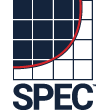SPEC releases CPU2006 benchmarks
Update of standard for computer performance evaluation
improves applications and testing for new generation of systems
WARRENTON, Va., August 24, 2006 - The Standard Performance
Evaluation Corp. (SPEC) today released SPEC CPU2006, the latest version
of the non-profit group's software for evaluating compute-intensive
performance across a wide range of hardware systems. SPEC's CPU
benchmarks have been the worldwide standard for measuring
compute-intensive performance since their introduction in 1989.
SPEC CPU2006 was developed by SPEC's Open Systems Group (OSG).
It measures component- and system-level performance for a wide
variety of operating systems and hardware that ranges from desktop
systems to workstations to large-scale servers.
SPEC CPU2006 replaces SPEC CPU2000, which will be phased out over
the next six months. Performance results from SPEC CPU2006 cannot
be compared to those from CPU2000, since new benchmarks have been
added and existing ones changed.
"Like bread, benchmarks need to stay fresh," says Walter
Bays, SPEC president. "SPEC CPU2000 was a remarkably successful
performance measurement tool, but it's time for a new standard that
better reflects changes brought on by the latest computer technology."
Real-world performance testing
SPEC CPU2006 is a useful tool for anyone interested in how hardware
systems will perform under compute-intensive workloads based on real
applications. This includes computer users, buyers evaluating system
options, hardware system vendors, researchers, and application developers.
Those who do not own a SPEC CPU2006 license can track performance results
on SPEC's web site.
Actual applications provided as source code are the basis for SPEC
CPU2006 benchmarks, which exercise a computer's processor, memory
architecture and compilers. Improvements in SPEC CPU2006 include
new and expanded benchmarks that represent a wider range of application
areas; larger applications with greater complexity that better represent
what today's users are running; and larger and longer-running workloads
that take into account today's system capabilities and provide headroom
for future performance growth.
SPEC CPU2006 benchmarks were selected from applications and source
codes running across multiple platforms. Some were derived from an
industry-wide search that paid up to $5,000 for application code and
datasets. Each benchmark was tested on different platforms to improve
portability and to determine if it was relevant and suitable for the
final SPEC CPU2006 suite.
What the benchmark measures
SPEC CPU2006 includes two benchmark suites: CINT2006 for measuring
compute-intensive integer performance, and CFP2006 for compute-intensive
floating point performance. The CINT2006 suite includes 12 application-based
benchmarks written in C and C++ languages. CFP2006 includes 17 CPU-intensive
benchmarks written in C, C++, Fortran, and a mixture of C and Fortran.
Performance metrics within SPEC CPU2006 measure system speed and throughput.
The speed metrics, SPECint2006 and SPECfp2006, compare the ability of a
computer to complete single tasks; in this case, each benchmark within SPEC
CPU2006. The throughput metrics, SPECint_rate2006 and SPECfp_rate2006,
measure the rate at which a computer can complete a number of tasks in a
given amount of time.
SPEC CPU2006 run and reporting rules permit users to compile the application
source code in two different ways that reflect common user preferences.
Base rules provide stricter compilation guidelines for those who prefer a
relatively simple build process. Peak rules have less strict requirements,
and are designed for those willing to invest more time and effort in
developing build procedures to maximize performance.
A supporting toolset in SPEC CPU2006 improves benchmarking consistency
for different users and testing environments. New features include
automated reporting of compiler flags, a config file preprocessor, and
expanded documentation.
A Sun Ultra Enterprise 2 workstation with a 296-MHz UltraSPARC II processor
is the reference machine for SPEC CPU2006. All benchmark results are
computed as ratios against the reference machine, so bigger scores are better.
An initial set of 70 SPEC CPU2006 results based on testing from nine different
SPEC member companies are available at the SPEC web site.
Now shipping
SPEC CPU2006 (CINT2006 and CFP2006) is available for immediate delivery on
DVD from SPEC. The cost is $800 for new customers, $400 for upgrades from
SPEC CPU2000, and $200 for qualified educational institutions. General
requirements for running the benchmarks include a Windows or UNIX operating
system, a DVD drive, 1 to 2 GB of memory, 8 GB of unused disk space, and a
set of compilers.
Additional product and ordering information are available on the SPEC
web site at www.spec.org/osg/cpu2006.
About SPEC
SPEC (www.spec.org) is a non-profit organization that establishes, maintains
and endorses standardized benchmarks to measure the performance of the
newest generation of high-performance computers. Its membership comprises
leading computer hardware and software vendors, universities, and research
organizations worldwide. For more information, contact Dianne Rice, SPEC,
6585 Merchant Place, Ste. 100, Warrenton, VA 20187, USA;
phone: 540-349-7878; fax: 540-349-5992;
e-mail: info@spec.org;
web: www.spec.org.
Press contacts:
Product and service names mentioned herein may be the trademarks of their
respective owners.




